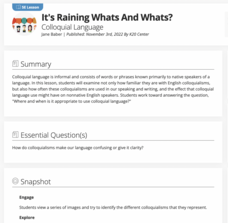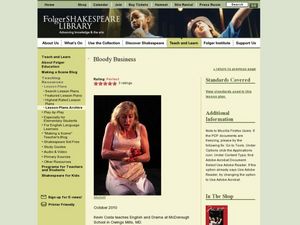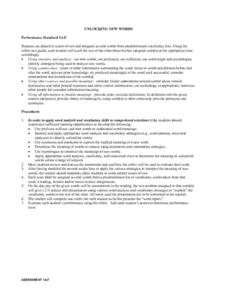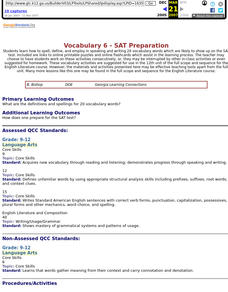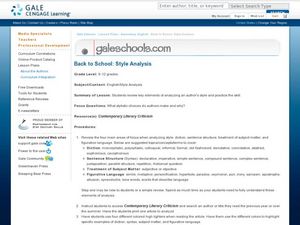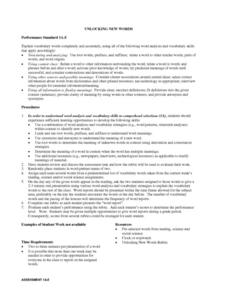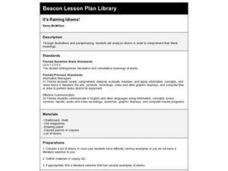Newseum
Disinformation Nation: Separating Politics and Propaganda
Separating political rhetoric from propaganda is no small feat. Class members are challenged to examine two different sources about a candidate in an upcoming election and determine whether the primary purpose of the source is to inform...
National Endowment for the Humanities
Dostoevsky's Crime and Punishment
Pain and suffering do not have to be inevitable in a study of Crime and Punishment. A carefully scaffolded lesson plan introduces readers to the divided natures of the characters in Fyodor Dostoevsky's complex novel. Groups use the...
K20 LEARN
It’s Raining Whats and Whats? Colloquial Language
"Yuns betta outten the lights!" Colloquial language is the focus of a lesson that asks middle schoolers to consider the pros and cons of using idioms. They read articles, match expressions with their meaning and place of origin, and...
K20 LEARN
Is Pizza Epic? Word Choice
Remember when everything was Fantastic! Fabulous! Awesome! Iconic! A series of activities encourages young writers to move beyond these overused descriptors and instead choose a more precise language.
Texas Education Agency (TEA)
Reference Guides (English III Reading)
An interactive resource introduces users to dictionaries, glossaries, and thesauri and the significant differences among these reference guides. Users learn which reference is best for which kind of search, examine sample entries from...
Texas Education Agency (TEA)
Drawing Conclusions Based on the Sufficiency and Strength of Research (English III Reading)
High school juniors learn how to construct a strong argument by crafting a claim and using neutral language backed by evidence from reliable sources. To do so, they learn to evaluate sources and evidence to support claims. They then...
Curated OER
Bloody Business
Students research word frequencies in Macbeth and create a frozen picture inspired by a word. For this Macbeth lesson, students view Blood Will Have Blood and discuss the dual meaning of the word "blood." Students identify five major...
K12 Reader
Winter Adjectives: Shades of Meaning
Is wet damper than soggy? Young grammarians consider shades of meaning by ranking a set of winter adjectives from the weakest to the strongest.
Curated OER
Incorporate an Aspect of Environmentalism into an Essay Writing Curriculum
Students listen to a brief explanation of the meaning of denotation and connotation and engage in discussion of the word conservation incorporating both denotations and connotations of the word. They outline the consequences of our...
Curated OER
Unlocking New Words: Partner Presentations
Following extensive modeling about how to apply word analysis and vocabulary skills to learn new words, partner teams create brief word presentations to teach new vocabulary to the class. Preselect words from upcoming social studies,...
Schools United to Provide Enhanced Resources Network
AP English Project: Journal of Literary Terms and Devices
To prepare for the AP English exams, individuals are asked to create a notebook of literary terms and devices. The terms must be defined, accompanied by representative artwork, and illustrated by an example drawn for a named source. A...
Curated OER
Eng 312: Final Exam
When paired with other powerpoints by Don L.F. Nilsen, this final exam covers topics addressed throughout previous lectures (slide 14 specifies which lectures should be reviewed). Teachers could use this presentation to craft their own...
Curated OER
Vocabulary 6 - SAT Preparation
High schoolers discover how to spell, define, and employ in speaking and writing 20 vocabulary words which are likely to show up on the SAT test. Included are links to online printable puzzles and online flashcards.
Curated OER
Slices of American Pie: The 1960s Through Music
Eleventh graders examine political, cultural, and social movements through music. In this 1960s American history lesson, 11th graders explore the music of the decade in order to better understand the complexity of the time period....
National Endowment for the Humanities
From Courage to Freedom: Slavery's Dehumanizing Effects
Learners analyze slavery and its effects on humanity using Frederick Douglass' autobiography. In this slavery instructional activity, high schoolers analyze instances of reality and romanticized myth using a slave narrative. Learners...
Curated OER
Back to School: Style Analysis
Jump back into expository writing and analysis at the start of a new school year! Start with a review of an authors' stylistic choices in diction, syntax, treatment of subject matter, and figurative language. Writers choose a text to...
Shakespeare Uncovered
Henry IV, Part I: Does Father Know Best?
“Yea, there thou mak’st me sad and mak’st me sin/In envy that my Lord Northumberland/Should be the father to so blest a son--.” Henry IV, Part I, provides the text for a series of exercises that ask class members to examine the...
Mr. Ambrose
The Great Gatsby, F. Scott Fitzgerald
Good discussion questions, quizzes, and tests teach as well as assess. Readers of The Great Gatsby will learn much from the materials in a 36-page packet designed to help students prepare for the AP Literature exam. Included in the...
Curated OER
Elements of Poetry
Prepare your learners to identify figurative language in poetry. Tips for reading poetry and what to look for are listed on these slides. Rhetorical devices are defined and plenty of examples are given.
Curated OER
Poetic Elements
Poetry is all about sound and rhythm. The sound of the words, the rhythm of the lines, and the emotional atmosphere created by these elements and the literary devices poets use, compress whole stories into a few stanzas. The specialized...
Curated OER
Unlocking New Words
Students are introduced to the various types of suffixes and prefixes. In groups, they identify the root words and determine the proper suffix or prefix to add to the root. They complete a worksheet and review their answers to end the...
Curated OER
"Words, words, words"
High schoolers discuss words that represent the "big ideas" in Othello and that recur throughout the play. They will be assigned words to track throughout the text, recording which character says the word and in what context.
Curated OER
Lord of the Flies - Sentence Starters and Vocabulary
Pupils prepare for the reading of iam Golding's novel, The Lord of the Flies, by exploring the theme through a discussion and sentence starter activity.
Curated OER
It's Raining Idioms!
Sixth graders analyze idioms and find examples from literature. They choose one idiom and finds pictures or draws pictures to show what it would mean if taken literally and what is it generally thought to mean.
Other popular searches
- Denotation and Connotation
- Denotation Connotation
- Connotation Denotation Ppt
- 113 Connotation Denotation
- Connotation Denotation Pot
- Denotation/connotation




